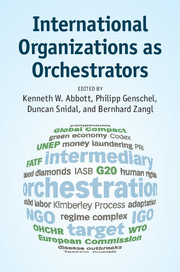Book contents
- Frontmatter
- Contents
- List of Figures
- List of Tables
- List of Contributors
- Acknowledgments
- List of Abbreviations
- Part I Introduction
- Part II Managing states
- 2 Orchestrating policy implementation
- 3 Orchestration on a tight leash
- 4 Orchestration by design
- 5 Efficient orchestration?
- 6 Orchestrating monitoring
- 7 Orchestrating enforcement
- Part III Bypassing states
- Part IV Implications
- References
- Index
4 - Orchestration by design
the G20 in international financial regulation
Published online by Cambridge University Press: 05 April 2015
- Frontmatter
- Contents
- List of Figures
- List of Tables
- List of Contributors
- Acknowledgments
- List of Abbreviations
- Part I Introduction
- Part II Managing states
- 2 Orchestrating policy implementation
- 3 Orchestration on a tight leash
- 4 Orchestration by design
- 5 Efficient orchestration?
- 6 Orchestrating monitoring
- 7 Orchestrating enforcement
- Part III Bypassing states
- Part IV Implications
- References
- Index
Summary
Abstract
The G20 has emerged as a central player in global financial regulation, but it does not easily fit existing governance models. What kind of governance power can the G20, an informal institution with no legal personality, no inherent technical expertise or infrastructure and no resources, exert? Moreover, faced with a global economic crisis, why did states work primarily through the institutionally weak G20 rather than through a stronger international financial institution? I argue that the concept of orchestration captures a good deal of how the G20 exercises governance and why it is attractive to states. Although it has no capacity of its own, the G20 is an increasingly focal actor within a large regime complex, with the power to convene and enlist intermediary bodies to carry out common regulatory goals. At the same time, only moderate convergence of state interests on regulatory goals helps explain why states pursue orchestration within the institutionally weak G20. Its design allows states to engage in regulation softly and indirectly, while avoiding sovereignty costs associated with more formal institutions. This chapter analyzes three cases of the G20 at work as orchestrator, in the areas of economic surveillance, banking regulation and accounting standards. The conclusion considers the implications of orchestration for the effectiveness of global financial regulation.
- Type
- Chapter
- Information
- International Organizations as Orchestrators , pp. 88 - 113Publisher: Cambridge University PressPrint publication year: 2015
- 41
- Cited by

